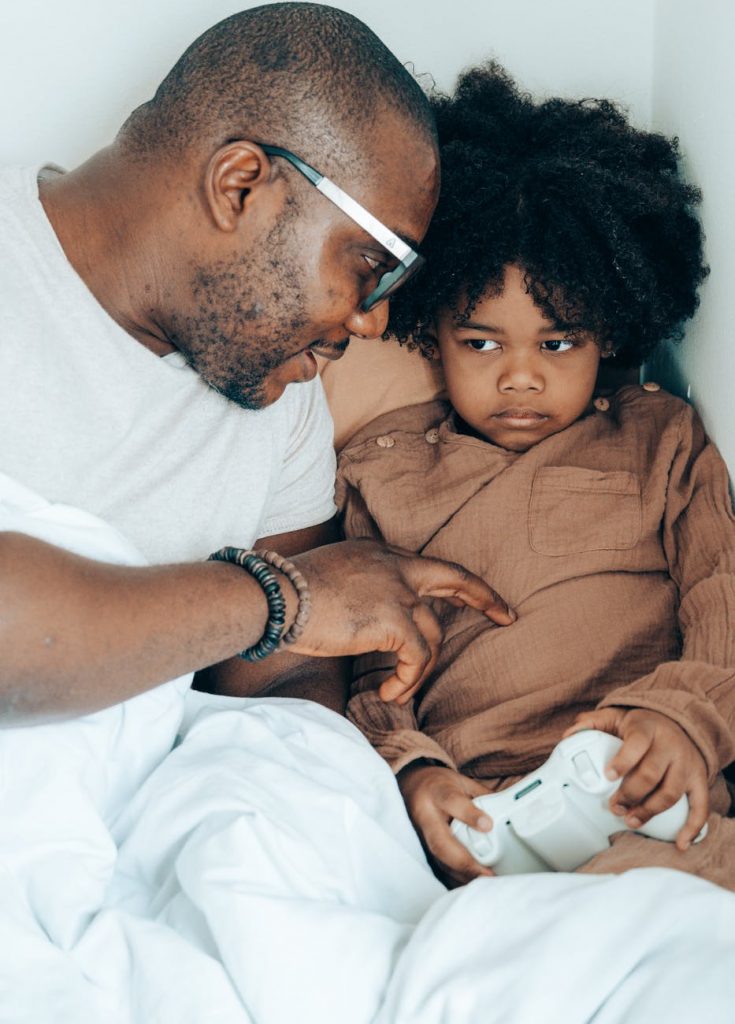Challenging circumstances, change and even wondering why the sea appears blue can all weigh on young minds. When you see your child feeling stressed, it’s only natural to want to sweep in and solve their problems.
But sweeping in and smothering isn’t always the best approach, and there are many ways to approach such a situation. Sometimes, a delicate touch is best.
Feeling worried is all part of growing up. When children get stuck in their anxiety and struggle to get out of it, it can make them feel more isolated and alone. If your child is struggling with anxiety, there are some helpful suggestions and strategies provided by Brush-Baby about what you can do. Here they are:
WHAT CAN CAUSE CHILDHOOD ANXIETY?
Like adults, children have to cope with a broad range of situations resulting in worry, fear and ultimately, anxiety. Unlike their parents, children aren’t as emotionally developed and so may struggle to separate their stressors from each situation. It’s sensible to first get to grips with the most common causes of anxiety in the young before figuring out what you can do to help.
For children and adolescents, anxiety can be caused by:
- Experiencing a lot of change in a short space of time, such as moving house, losing a loved one or school
- Feeling overwhelmed by a situation at school, work, exams or their peers
- A distressing or traumatic experience, such as being bullied or experiencing abuse. Ultimately, anything that makes them feel unsafe
- Experiencing a parent’s anxiety or family stress
- Having to manage responsibilities that are not appropriate for their age and developmental stage, such as caring for a family member

RECOGNISE WHEN IT HAS BECOME A PROBLEM
However, it should be acknowledged that some anxiety is normal, and recognising when it’s become a problem is key. The NHS, in their article about anxiety in children, cautions that ‘’Anxiety becomes a problem for children when it starts to get in the way of their everyday life.’’ They go on to suggest a few signs that anxiety has become more prevalent include:
- become irritable, tearful or clingy
- have difficulty sleeping
- wake in the night
- start wetting the bed
- have bad dreams
MANAGE ANXIETY, DON’T TRY TO AVOID IT
It is incredibly difficult to see your child unhappy. You have seen them in all of their best moments and all of their worst, and when anxiety rears its ugly head, you may want to remove all the stressors that trigger it.
Learning how to tolerate anxiety and function as best as they can throughout their day will encourage children to overcome their anxiety in their own way, which is also, often, the most sustainable way. This is because it gives your child the tools going forward to cope with stressful situations.
Talk about what makes your child feel anxious in a sensitive and delicate way, and how those situations make them feel. Come up with strategies that can help them feel safe and reduce their stress. Some popular strategies include:
- Journaling or drawing
- Going out for a walk or exploring nature
- Talking with someone they trust
- A “safe space” they can go to
- Exercise such as swimming, kayaking, HITT, tennis, football or climbing
Ultimately, whatever encourages your child to feel less anxious or helps them control their worries will help them overcome those anxieties over time. Check out the Child Mind Institute’s useful tips on doing just that for more.
AVOIDING SITUATIONS MAY REINFORCE ANXIETY
It may seem counterintuitive to confront things head on that make your child feel anxious, but avoiding certain situations may only serve to reinforce their anxiety.
If your child feels uncomfortable about a situation, they might cry because they don’t know how else to express their feelings. But removing your child from a stressful but ultimately harmless situation may prolong the cycle of fear, and change becomes more challenging.
It’s important to respect your child’s feelings, but at the same time, don’t place undue emphasis on overreactions. For example, if they are terrified of going to the emergency room but have a twisted ankle, it would be unwise not to take them! Instead, be empathetic, listen, and help your child to face their fear with courage.
Remember, you are there to help your child through any situation that is too much for them to do independently. So, don’t amplify their feelings by simply agreeing, but encourage them to see why it’s essential to overcome them.
HAVE REALISTIC EXPECTATIONS
Life can be uncompromising and at times overwhelming. Imagine that feeling as a child.
Creating unrealistic expectations for your child can serve to enhance feelings of stress. Kids feel more confident when they know that you will never ask them for anything more than they can handle as their parent or guardian. Remember, failure is ok. In fact, it’s to be encouraged as a learning experience. Remind your child of this and set them free!
ENCOURAGE YOUR CHILD TO TALK
Sharing our problems with those who we trust helps us to move on from a situation and your child is no different. Like you, they need the space to speak and work through their feelings with someone trustworthy.
Avoid leading questions like “are you worried about” or “is X making you feel,” as this will feed into a potential cycle of stress. Instead, ask open-ended questions that they can flesh out with an answer on their terms, such as “how do you feel about X.”
Body language and your tone of voice can affect a conversation, so be gentle, kind and understanding in the way you approach such discussion, as well as what you say.

BE A ROLE MODEL
For most children, their parents are their absolute role models. You’ve been there from the moment they first opened their eyes, learned to walk and said their first word. From their first day at school to celebrate their successes, you’ve been present at every single big life event.
Children are incredibly perceptive. The best way to teach your child to handle anxiety is to show them how you cope with your own. Let them see how you manage it, who you talk to and let them see you getting through each moment. After all, you’re their greatest role model!
SEEK PROFESSIONAL HELP SHOULD THE SITUATION WORSEN
Should your child’s anxiety seem to be worsening, or if it’s been persistent for some time, then consult with your GP for advice. Alternatively, Young Minds have a free parent helpline, which can be reached on 0808 802 5544, from Monday to Friday, 9.30 am to 4 pm.
They may suggest a referral to Children and Young People’s Mental Health Services (CYPMHS), who can, in turn, help you gain access to counselling, Cognitive Behavioural Therapy (CBT) and anxiety medicines, if they think it’ll help. You might also want to check out this article on BetterHelp about finding child counsellors in your local area for more advice on the topic.
Overcoming anxiety can be challenging for your child. But with the right coping strategies in place, you can help your child overcome their obstacles.
*This article is not intended to replace medical advice, diagnosis or treatment given by a qualified health professional. Instead, this article only provides information, not advice. For any medical enquiries, always consult your GP first*





